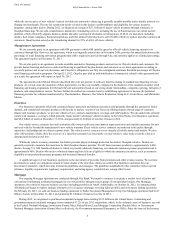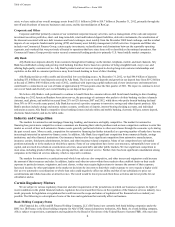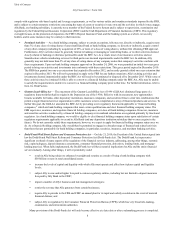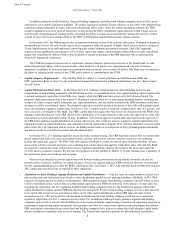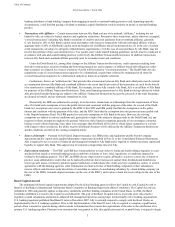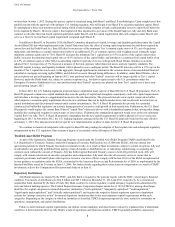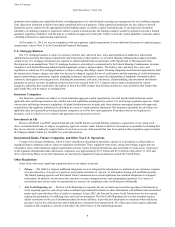Ally Bank 2012 Annual Report Download - page 14
Download and view the complete annual report
Please find page 14 of the 2012 Ally Bank annual report below. You can navigate through the pages in the report by either clicking on the pages listed below, or by using the keyword search tool below to find specific information within the annual report.12
action plan must include a description of all planned capital actions over a nine-quarter planning horizon, including any issuance of a debt or
equity capital instrument, any capital distribution, and any similar action that the FRB determines could have an impact on Ally’s consolidated
capital. The proposed capital action plan must also include a discussion of how Ally will maintain capital above the minimum regulatory
capital ratios and above a Tier 1 common equity-to-total risk-weighted assets ratio of 5 percent, and serve as a source of strength to Ally
Bank. The FRB's capital plan rule requires that Ally receive no objection from the FRB prior to making a capital distribution. Ally submitted
its capital plan in January 2013. Failure to obtain no objection to this plan could limit our ability to pay dividends, redeem or repurchase
securities, or take other capital actions in the future.
In addition, in December 2011, the FRB proposed rules to implement certain provisions of the systemic risk regime under the Dodd-
Frank Wall Street Reform and Consumer Protection Act (Dodd-Frank Act). If adopted as proposed, among other provisions, the rules would
require Ally to maintain a sufficient quantity of highly liquid assets to survive a projected 30-day liquidity stress event and implement various
liquidity-related corporate governance measures; limit Ally’s aggregate exposure to any unaffiliated counterparty to 25% of Ally’s capital and
surplus; and potentially subject Ally to an early remediation regime that could limit the ability of Ally to pay dividends or expand its business
if the FRB identified Ally as suffering from financial or management weaknesses. The systemic risk provisions, when implemented, could
adversely affect our business prospects, results of operations, and financial condition.
Our ability to rely on deposits as a part of our funding strategy may be limited.
Ally Bank continues to be a key part of our funding strategy, and we have increased our reliance on deposits as an alternative source of
funding through Ally Bank. Ally Bank does not have a retail branch network, and it obtains its deposits through direct banking and brokered
deposits which, at December 31, 2012, included $9.4 billion of brokered certificates of deposit that may be more price sensitive than other
types of deposits and may become less available if alternative investments offer higher interest rates. At December 31, 2012, brokered
deposits represented 20% of Ally Bank total deposits. Our ability to maintain our current level of deposits or grow our deposit base could be
affected by regulatory restrictions including the possible imposition of prior approval requirements, restrictions on deposit growth, or
restrictions on our rates offered. In addition, perceptions of our financial strength, rates offered by third parties, and other competitive factors
beyond our control, including returns on alternative investments, will also impact our ability to grow our deposit base. Even if we are able to
grow the deposit base of Ally Bank, our regulators may impose restrictions on our ability to use Ally Bank deposits as a source of funding for
certain business activities potentially raising the cost of funding those activities without the use of Ally Bank deposits.
The regulatory environment in which we operate could have a material adverse effect on our business and earnings.
Our domestic operations are subject to various laws and judicial and administrative decisions imposing various requirements and
restrictions relating to supervision and regulation by state and federal authorities. Such regulation and supervision are primarily for the benefit
and protection of our customers, not for the benefit of investors in our securities, and could limit our discretion in operating our business.
Noncompliance with applicable statutes, regulations, rules, or policies could result in the suspension or revocation of any license or
registration at issue as well as the imposition of civil fines and criminal penalties.
Ally, Ally Bank, and many of our nonbank subsidiaries are heavily regulated by bank and other regulatory agencies at the federal and
state levels. This regulatory oversight is established to protect depositors, the FDIC’s Deposit Insurance Fund, and the banking system as a
whole, not security holders. Changes to statutes, regulations, rules, or policies including the interpretation or implementation of statutes,
regulations, rules, or policies could affect us in substantial and unpredictable ways including limiting the types of financial services and
products we may offer, limiting our ability to pursue acquisitions and increasing the ability of third parties to offer competing financial
services and products.
Our operations are also heavily regulated in many jurisdictions outside the United States. For example, certain of our foreign subsidiaries
operate either as a bank or a regulated finance company, and our insurance operations are subject to various requirements in the foreign
markets in which we operate. The varying requirements of these jurisdictions may be inconsistent with U.S. rules and may materially
adversely affect our business or limit necessary regulatory approvals, or if approvals are obtained, we may not be able to continue to comply
with the terms of the approvals or applicable regulations. In addition, in many countries, the regulations applicable to the financial services
industry are uncertain and evolving.
Our inability to remain in compliance with regulatory requirements in a particular jurisdiction could have a material adverse effect on
our operations in that market with regard to the affected product and on our reputation generally. No assurance can be given that applicable
laws or regulations will not be amended or construed differently, that new laws and regulations will not be adopted, or that we will not be
prohibited by local laws or regulators from raising interest rates above certain desired levels, any of which could materially adversely affect
our business, operating flexibility, financial condition, or results of operations.
Financial services legislative and regulatory reforms may have a significant impact on our business and results of operations.
The Dodd-Frank Act, which became law in July 2010, has and will continue to substantially change the legal and regulatory framework
under which we operate. Certain portions of the Dodd-Frank Act were effective immediately, and others have become effective since
enactment, while others are subject to further rulemaking and discretion of various regulatory bodies. The Dodd-Frank Act, when fully
implemented, will have material implications for Ally and the entire financial services industry. Among other things, it will or potentially
could:
Table of Contents
Ally Financial Inc. • Form 10-K



